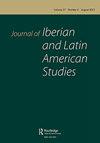跨国法西斯主义:葡萄牙和巴西的整合主义Plínio萨尔加多
IF 0.3
0 HUMANITIES, MULTIDISCIPLINARY
Journal of Iberian and Latin American Studies
Pub Date : 2023-05-04
DOI:10.1080/14701847.2023.2226977
引用次数: 0
摘要
1932年10月7日,巴西统一运动(AIB)成立,是拉丁美洲最成功的法西斯运动。在Plínio Salgado的领导下,其目的是创造一种原创的学说。法西斯政治并不局限于欧洲——它跨越国界,直接影响了拉丁美洲的政治。鉴于此,本研究采用法西斯主义是一种跨国和跨大西洋现象的原则。拉丁美洲法西斯主义影响广泛,受到伊比利亚国家的强烈影响。在这种背景下,本分析调查了巴西法西斯运动,整合主义,一个受到巴西知识循环文化影响的组织,特别是在挪用葡萄牙元素方面。AIB在巴西获得了前所未有的知名度,在20世纪30年代是一个主要的社会机构,但在1937年结束。这并没有结束巴西的法西斯主义——在流亡葡萄牙的领导人Plínio Salgado的领导下,它的活动仍在继续,他重新组织了自己的思想、行动和政治策略。第二次世界大战后,整合主义获得了新的定义:António de Oliveira Salazar成为运动中社团主义政治的代言人,并一直担任这一角色,直到整合主义结束,以Plínio Salgado于1975年去世为标志。本文章由计算机程序翻译,如有差异,请以英文原文为准。
Transnational Fascism: Portugal and the Brazilian Integralism of Plínio Salgado
ABSTRACT The Brazilian Integralist Action (AIB), the most successful fascist movement in Latin America, was created on 7 October 1932. Under the leadership of Plínio Salgado, its purpose was to create an original doctrine. Fascist politics were not restricted to Europe – it crossed borders and directly influenced Latin American politics. In view of this, this research adopts the principle that fascism is a transnational and transatlantic phenomenon. Latin American fascism was wide-reaching and strongly affected by Iberian countries. Amidst this context, the present analysis investigates the Brazilian fascist movement, integralism, an organization that has been culturally influenced by the Brazilian intellectual circularity, especially regarding its appropriation of Portuguese elements. The AIB gained unprecedented visibility in Brazil and was a major social institution in the 1930s but came to an end in 1937. This did not end Brazilian fascism – its activities continued under leader Plínio Salgado, who lived in exile in Portugal, when he reorganized his thoughts, actions, and political strategies. Integralism gained a new definition after World War II: António de Oliveira Salazar became the face of the corporatist politics of the movement and remained in this role until the end of integralism, marked by the death of Plínio Salgado in 1975.
求助全文
通过发布文献求助,成功后即可免费获取论文全文。
去求助
来源期刊

Journal of Iberian and Latin American Studies
HUMANITIES, MULTIDISCIPLINARY-
CiteScore
0.40
自引率
33.30%
发文量
23
 求助内容:
求助内容: 应助结果提醒方式:
应助结果提醒方式:


